孔子语录(论语)中英文对照翻译
文言文孔子语录翻译
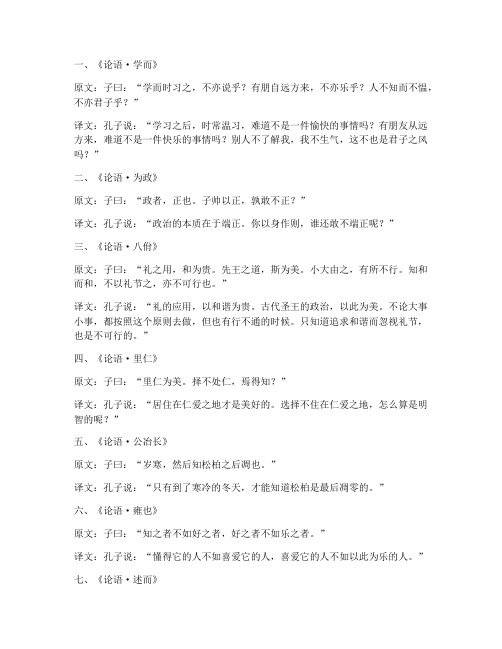
一、《论语·学而》原文:子曰:“学而时习之,不亦说乎?有朋自远方来,不亦乐乎?人不知而不愠,不亦君子乎?”译文:孔子说:“学习之后,时常温习,难道不是一件愉快的事情吗?有朋友从远方来,难道不是一件快乐的事情吗?别人不了解我,我不生气,这不也是君子之风吗?”二、《论语·为政》原文:子曰:“政者,正也。
子帅以正,孰敢不正?”译文:孔子说:“政治的本质在于端正。
你以身作则,谁还敢不端正呢?”三、《论语·八佾》原文:子曰:“礼之用,和为贵。
先王之道,斯为美。
小大由之,有所不行。
知和而和,不以礼节之,亦不可行也。
”译文:孔子说:“礼的应用,以和谐为贵。
古代圣王的政治,以此为美。
不论大事小事,都按照这个原则去做,但也有行不通的时候。
只知道追求和谐而忽视礼节,也是不可行的。
”四、《论语·里仁》原文:子曰:“里仁为美。
择不处仁,焉得知?”译文:孔子说:“居住在仁爱之地才是美好的。
选择不住在仁爱之地,怎么算是明智的呢?”五、《论语·公冶长》原文:子曰:“岁寒,然后知松柏之后凋也。
”译文:孔子说:“只有到了寒冷的冬天,才能知道松柏是最后凋零的。
”六、《论语·雍也》原文:子曰:“知之者不如好之者,好之者不如乐之者。
”译文:孔子说:“懂得它的人不如喜爱它的人,喜爱它的人不如以此为乐的人。
”七、《论语·述而》原文:子曰:“三人行,必有我师焉。
择其善者而从之,其不善者而改之。
”译文:孔子说:“三个人同行,其中必定有我可以学习的人。
我选择他们的优点来学习,看到他们的不足就加以改正。
”八、《论语·泰伯》原文:子曰:“君子坦荡荡,小人长戚戚。
”译文:孔子说:“君子心胸宽广,小人则常常忧愁。
”九、《论语·子罕》原文:子曰:“君子食无求饱,居无求安,敏于事而慎于言,可谓好学也已。
”译文:孔子说:“君子饮食不求饱足,居住不求安逸,勤于工作而谨慎言语,可以说是好学了。
孔子的论语中英文
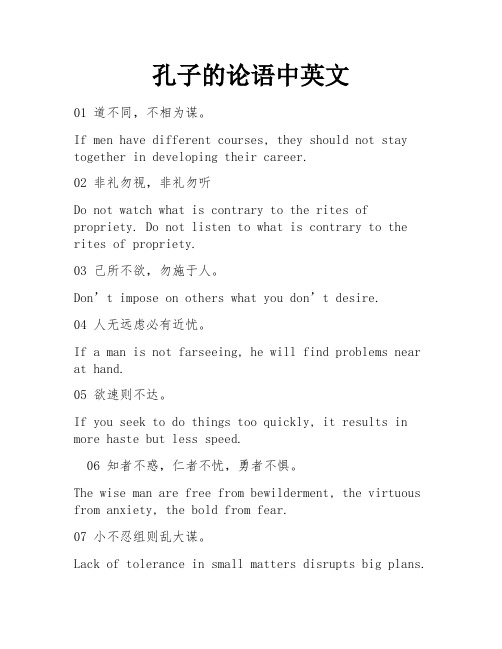
孔子的论语中英文01 道不同,不相为谋。
If men have different courses, they should not stay together in developing their career.02 非礼勿视,非礼勿听Do not watch what is contrary to the rites of propriety. Do not listen to what is contrary to the rites of propriety.03 己所不欲,勿施于人。
Don’t impose on others what you don’t desire.04 人无远虑必有近忧。
If a man is not farseeing, he will find problems near at hand.05 欲速则不达。
If you seek to do things too quickly, it results in more haste but less speed.06 知者不惑,仁者不忧,勇者不惧。
The wise man are free from bewilderment, the virtuous from anxiety, the bold from fear.07 小不忍组则乱大谋。
Lack of tolerance in small matters disrupts big plans.08 见贤思齐,见不贤而内自省也。
When we see a man of true virtue, we should think of equaling them. When we see an unethical man, we should look inwards and reflect on ourselves.09 工欲善其事必先利其器。
The mechanic, who wishes to do his work well, must sharpen his tools first.10 父母在,不远游, 游必有方。
孔子论语十则__原文翻译译文
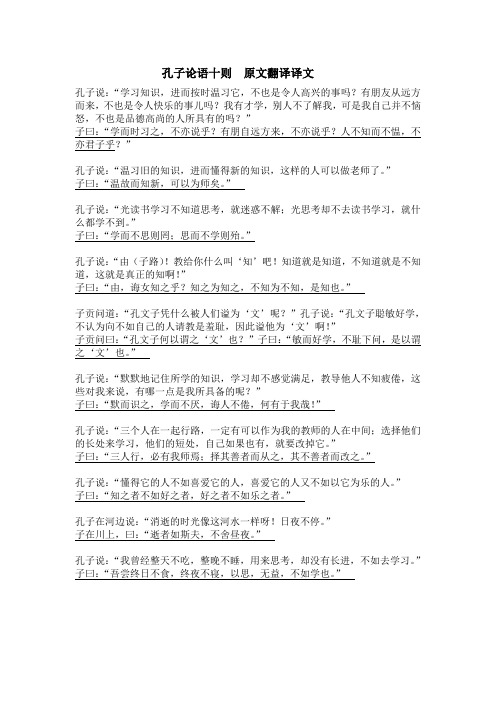
孔子论语十则原文翻译译文孔子说:“学习知识,进而按时温习它,不也是令人高兴的事吗?有朋友从远方而来,不也是令人快乐的事儿吗?我有才学,别人不了解我,可是我自己并不恼怒,不也是品德高尚的人所具有的吗?”子曰:“学而时习之,不亦说乎?有朋自远方来,不亦说乎?人不知而不愠,不亦君子乎?”孔子说:“温习旧的知识,进而懂得新的知识,这样的人可以做老师了。
”子曰:“温故而知新,可以为师矣。
”孔子说:“光读书学习不知道思考,就迷惑不解;光思考却不去读书学习,就什么都学不到。
”子曰:“学而不思则罔;思而不学则殆。
”孔子说:“由(子路)!教给你什么叫‘知’吧!知道就是知道,不知道就是不知道,这就是真正的知啊!”子曰:“由,诲女知之乎?知之为知之,不知为不知,是知也。
”子贡问道:“孔文子凭什么被人们谥为‘文’呢?”孔子说:“孔文子聪敏好学,不认为向不如自己的人请教是羞耻,因此谥他为‘文’啊!”子贡问曰:“孔文子何以谓之‘文’也?”子曰:“敏而好学,不耻下问,是以谓之‘文’也。
”孔子说:“默默地记住所学的知识,学习却不感觉满足,教导他人不知疲倦,这些对我来说,有哪一点是我所具备的呢?”子曰:“默而识之,学而不厌,诲人不倦,何有于我哉!”孔子说:“三个人在一起行路,一定有可以作为我的教师的人在中间;选择他们的长处来学习,他们的短处,自己如果也有,就要改掉它。
”子曰:“三人行,必有我师焉;择其善者而从之,其不善者而改之。
”孔子说:“懂得它的人不如喜爱它的人,喜爱它的人又不如以它为乐的人。
”子曰:“知之者不如好之者,好之者不如乐之者。
”孔子在河边说:“消逝的时光像这河水一样呀!日夜不停。
”子在川上,曰:“逝者如斯夫,不舍昼夜。
”孔子说:“我曾经整天不吃,整晚不睡,用来思考,却没有长进,不如去学习。
”子曰:“吾尝终日不食,终夜不寝,以思,无益,不如学也。
”。
孔子名言中英对照警句翻译孔子名言

孔子名言中英对照警句翻译孔子名言孔子名言中英对照警句翻译孔子名言中英对照警句翻译孔子名言中英对照1、有教无类。
in teaching there should be no distinction of classes。
2、言必信,行必果。
keep what you say and carry out what you do。
3、有朋自远方来,不亦乐乎is it not delightful to have friends coming from distant quarters4、德不孤,必有邻。
virtue is not left to stand alone。
he who practices it will have neighbors。
5、当仁,不让于师。
when it comes to benevolence,one need not give precedence even to his teacher。
6、人无远虑,必有近忧。
if a man take no thought about what is distant,he will find sorrow near at hand。
7、学而时习之,不亦说乎is it not pleasant to learn with a constant perseveranceand application 8、学而不思则罔,思而不学则殆。
learning without thought is labour lost;thought without learning is perilous。
9、食不厌精,脍不厌细。
he did not dislike to have his rice finely cleaned,nor to have his minced meat cut quite small。
10、学如不及,犹恐失之。
learn as if you could not reach your object,and were always fearing also lest you should lose it。
孔子语录英汉对照

孔子语录英汉对照第一篇:孔子语录英汉对照1.子曰:“学而时习之,不亦悦乎?有朋自远方来,不亦乐乎?人不知而不愠,不亦君子乎?”The Master said, “to learn and at due times to repeat what one has learned, is that not after all a pleasure? That friends should come to one from afar, is this not after all delightful? To remain unsoured even though one's merits are unrecognized by others, is that not after all what is expected of a gentleman?”2.子曰:“吾十有五而志于学,三十而立,四十而不惑,五十而知天命,六十而耳顺,七十而从心所欲,不逾矩。
”The Master said, “At fifteen I set my heart upon learning.At thirty, I planted my feet firm upon the ground.At forty, I no longer suffered from perplexities(困惑;窘困).At fifty, I knew what were the biddings(命令,吩咐)of Heaven.At sixty, I heard them with docile(驯顺的,驯良的)ear.At seventy, I could follow the dictates(听从...支配)of my own heart;for what I desired no longer overstepped(逾越)the boundaries of right.”3.子曰:“贤哉回也!一箪食,一瓢饮,在陋巷,人不堪其忧,回也不改其乐。
孔子名言《论语》中的名言名句(英汉对照)

孔子名言《论语》中的名言名句(英汉对照)一、唯女子与小人,为难养也。
近之则不孙,远之则怨。
Of all people, girls and servants are the most difficultto behave to. If you are familiar with them, they lose their humility. If you maintain a reserve towards them, they are discontented.二、父母在,不远游,游必有方。
While his parents are alive, the son may not go abroad to a distance. If he does go abroad, he must have a fixed placeto which he goes.三、德不孤,必有邻。
Virtue is not left to stand alone. He who practices itwill have neighbors.四、吾十有五而志于学,三十而立,四十而不惑,五十而知天命,六十而耳顺,七十而从心所欲,不逾矩。
At fifteen I set my heart upon learning. At thirty, I planted my feet firm upon the ground. At forty, I no longer suffered from perplexities . At fifty, I knew what thebiddings of Heaven were. At sixty, I heard them with docile ear. At seventy, I could follow the dictates of my own heart; for what I desired no longer overstepped the boundaries of right.五、贤哉回也!一箪食,一瓢饮,在陋巷,人不堪其忧,回也不改其乐。
(完整版)孔子论语十则--原文翻译译文

孔子论语十则原文翻译译文1.子曰:“学而时习之,不亦说孔子说:“学习知识,并按时温习它,不也是令人高兴的乎?有朋自远方来,不亦乐事吗?有朋友从远方而来到这里,不也是令人快乐的事情乎?人不知而不愠,不亦君子吗?别人不了解自己,却不恼怒,不也是道德上有修养的乎?”人吗?”2.子曰:“温故而知新,孔子说:“温习学过的知识,可以得到新的理解与体会,可以为师矣。
”可以凭借这点当老师了。
”3.子曰:“学而不思则罔;孔子说:“光知道读书学习却不知道思考,就会迷惑不解;思而不学则殆。
”光知道思考却不知道读书学习,就会对精神有所伤害。
”4.子曰:“由,诲女知之乎?知之为知之,不知为不知,是孔子说:“由(子路)!教给你什么叫‘知’吧!知道就是知道,不知道就是不知道,这就是真正的知啊!”子贡问曰:“孔文子何以谓之‘文’也?”子曰:“敏而好学,不耻下问,是以谓之‘文’也。
”子贡问道:“孔文子凭什么被人们谥为‘文’呢?”孔子说:“孔文子聪敏好学,不认为向不如自己的人请教是羞耻,因此谥他为‘文’啊!”子曰:“默而识之,学而不厌,诲人不倦,何有于我哉!”孔子说:“默默地记住所学的知识,学习却不感觉满足,教导他人不知疲倦,这些对我来说,有哪一点是我所具备的呢?”子曰:“三人行,必有我师焉;择其善者而从之,其不善者而改之。
”孔子说:“三个人在一起行路,一定有可以作为我的教师的人在中间;选择他们的长处来学习,他们的短处,自己如果也有,就要改掉它。
”子曰:“知之者不如好之者,好之者不如乐之者。
”孔子说:“懂得它的人不如喜爱它的人,喜爱它的人又不如以它为乐的人。
”子在川上,曰:“逝者如斯夫,不舍昼夜。
”孔子在河边说:“消逝的时光像这河水一样呀!日夜不停。
”子曰:“吾尝终日不食,终夜不寝,以思,无益,不如学也。
”孔子说:“我曾经整天不吃,整晚不睡,用来思考,却没有长进,不如去学习。
”。
《论语》中的《孔子语录》的原文和翻译。
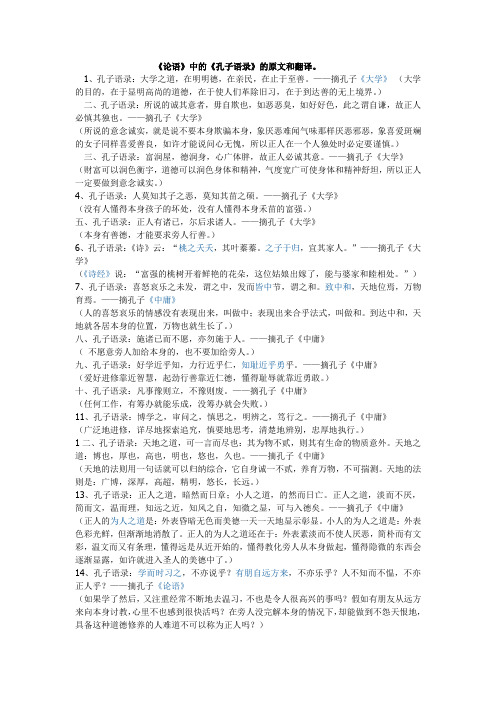
《论语》中的《孔子语录》的原文和翻译。
1、孔子语录:大学之道,在明明德,在亲民,在止于至善。
——摘孔子《大学》(大学的目的,在于显明高尚的道德,在于使人们革除旧习,在于到达善的无上境界。
)二、孔子语录:所说的诚其意者,毋自欺也,如恶恶臭,如好好色,此之谓自谦,故正人必慎其独也。
——摘孔子《大学》(所说的意念诚实,就是说不要本身欺骗本身,象厌恶难闻气味那样厌恶邪恶,象喜爱斑斓的女子同样喜爱善良,如许才能说问心无愧,所以正人在一个人独处时必定要谨慎。
)三、孔子语录:富润屋,德润身,心广体胖,故正人必诚其意。
——摘孔子《大学》(财富可以润色衡宇,道德可以润色身体和精神,气度宽广可使身体和精神舒坦,所以正人一定要做到意念诚实。
)4、孔子语录:人莫知其子之恶,莫知其苗之硕。
——摘孔子《大学》(没有人懂得本身孩子的坏处,没有人懂得本身禾苗的富强。
)五、孔子语录:正人有诸已,尔后求诸人。
——摘孔子《大学》(本身有善德,才能要求旁人行善。
)6、孔子语录:《诗》云:“桃之夭夭,其叶蓁蓁。
之子于归,宜其家人。
”——摘孔子《大学》(《诗经》说:“富强的桃树开着鲜艳的花朵,这位姑娘出嫁了,能与婆家和睦相处。
”)7、孔子语录:喜怒哀乐之未发,谓之中,发而皆中节,谓之和。
致中和,天地位焉,万物育焉。
——摘孔子《中庸》(人的喜怒哀乐的情感没有表现出来,叫做中;表现出来合乎法式,叫做和。
到达中和,天地就各居本身的位置,万物也就生长了。
)八、孔子语录:施诸已而不愿,亦勿施于人。
——摘孔子《中庸》(不愿意旁人加给本身的,也不要加给旁人。
)九、孔子语录:好学近乎知,力行近乎仁,知耻近乎勇乎。
——摘孔子《中庸》(爱好进修靠近智慧,起劲行善靠近仁德,懂得耻辱就靠近勇敢。
)十、孔子语录:凡事豫则立,不豫则废。
——摘孔子《中庸》(任何工作,有筹办就能乐成,没筹办就会失败。
)11、孔子语录:博学之,审问之,慎思之,明辨之,笃行之。
——摘孔子《中庸》(广泛地进修,详尽地探索追究,慎要地思考,清楚地辨别,忠厚地执行。
孔子名言《论语》中的名言名句(英汉对照)
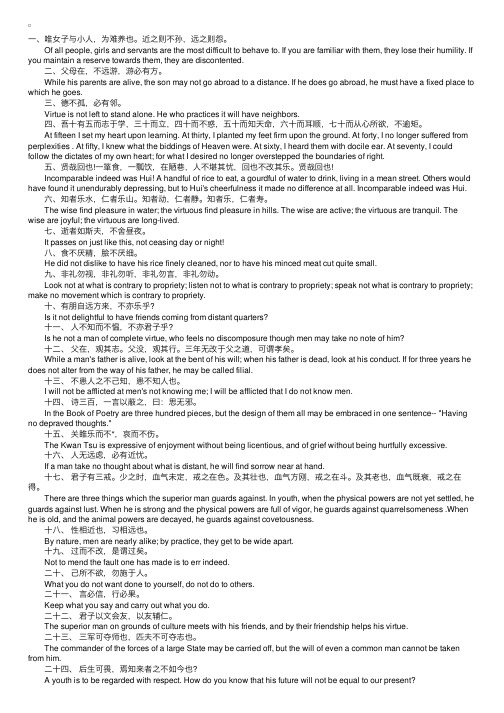
⼀、唯⼥⼦与⼩⼈,为难养也。
近之则不孙,远之则怨。
Of all people, girls and servants are the most difficult to behave to. If you are familiar with them, they lose their humility. If you maintain a reserve towards them, they are discontented. ⼆、⽗母在,不远游,游必有⽅。
While his parents are alive, the son may not go abroad to a distance. If he does go abroad, he must have a fixed place to which he goes. 三、德不孤,必有邻。
Virtue is not left to stand alone. He who practices it will have neighbors. 四、吾⼗有五⽽志于学,三⼗⽽⽴,四⼗⽽不惑,五⼗⽽知天命,六⼗⽽⽿顺,七⼗⽽从⼼所欲,不逾矩。
At fifteen I set my heart upon learning. At thirty, I planted my feet firm upon the ground. At forty, I no longer suffered from perplexities . At fifty, I knew what the biddings of Heaven were. At sixty, I heard them with docile ear. At seventy, I could follow the dictates of my own heart; for what I desired no longer overstepped the boundaries of right. 五、贤哉回也!⼀箪⾷,⼀瓢饮,在陋巷,⼈不堪其忧,回也不改其乐。
孔子语录《论语》中英文对照

孔子语录《论语》中英文对照第一篇:孔子语录《论语》中英文对照孔子语录《论语》中英文对照最近电影《孔子》正在热映中,孔子的《论语》我们在学校里已经学过很多,这里我们来一起了解下,《论语》中的句子翻译成英语都是什么样吧。
本文的句子主要是求知求学类的。
有教无类。
In teaching there should be no distinction of classes.当仁,不让于师。
When it comes to benevolence, one need not give precedence even to his teacher.学而时习之,不亦说乎?Is it not pleasant to learn with a constant perseveranceand application? 温故而知新,可以为师矣。
If a man keeps cherishing his old knowledge, so as continually to be acquiring new, he may be a teacher of others.学而不思则罔,思而不学则殆。
Learning without thought is labourlost;thought without learning is perilous.敏而好学,不耻下问。
He was of an active nature and yet fond of learning, and he was not ashamed to ask and learn of his inferiors.十室之邑,必有忠信,如丘者焉,不如丘之好学也。
In a hamlet of ten families, there may be found one honourable and sincere as I am, but not so fond of learning.知之者,不如好之者,好之者,不如乐之者。
孔子语录英文

孔子语录英文1、子曰:“三人行,必有我师焉:则其善者而从之,其不善者而改之。
”Confucius said,”Whenever I walk with two other men,I can always find teachers in them.I can learn from their good qualities,and correct those faults in me which are like theirs.译文:孔子说:“别人的言行举止,必定有值得我学习的地方。
选择别人好的学习,看到别人缺点,反省自身有没有同样的缺点,如果有,加以改正。
2、曾子曰:“吾日三省吾身:为人谋而不忠乎?与朋友交而不信乎?传不习乎?”Zengzi said,"I examine myself three times daily:Have I been faithful in doing things for others?Have I been trustworthy in contacts with friends?Have I reviewed and practised what my teacher has taught me?"译文:每天都要作多次自我检讨:为人出谋献计做到忠心不二了吗?与朋友交往做到诚信了吗?老师所传授的东西经常温习了吗?3、子曰:“学而不思则罔,思而不学则殆。
”Confucius said,”Learning without thought is puzzled;thought without learning is dangerous.”译文:一味读书而不思考,就会因为不能深刻理解书本的意义而不能合理有效利用书本的知识,甚至会陷入迷茫。
而如果一味空想而不去进行实实在在地学习和钻研,则终究是沙上建塔,一无所得。
4、子曰:“学而时习之,不亦悦乎?有朋自远方来,不亦乐乎?人不知而不愠,不亦君子乎?”Confucius said,”Is it not a pleasure to learn and apply from time to time what is learned?Is it not a joy to see a friend who has come from a faraway place?Is it not gentlemanly to have no resentment when one is not properly understood?”译文:学习新知然后能做到时常温习它,这不是一件很令人愉快的事情吗?有朋友从远方来,这不是一件很令人快乐的事情吗?别人不了解我,但我的心里一点也感觉到生气、怨恨,这不正是君子之所为吗?5、子曰:“温故而知新。
孔子语录十则原文及翻译
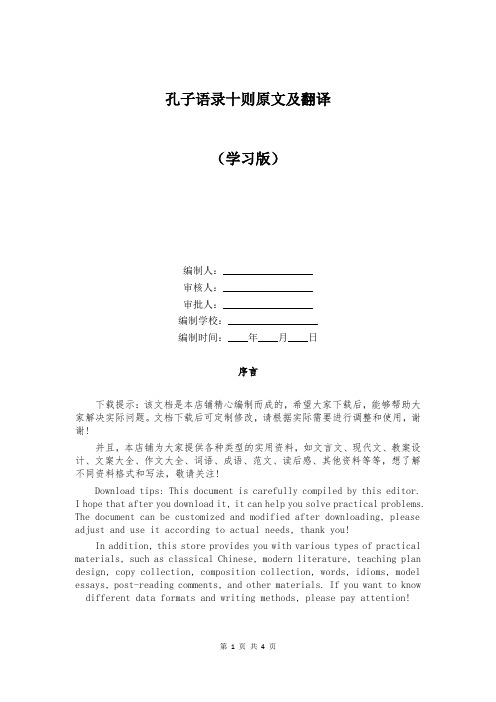
孔子语录十则原文及翻译(学习版)编制人:__________________审核人:__________________审批人:__________________编制学校:__________________编制时间:____年____月____日序言下载提示:该文档是本店铺精心编制而成的,希望大家下载后,能够帮助大家解决实际问题。
文档下载后可定制修改,请根据实际需要进行调整和使用,谢谢!并且,本店铺为大家提供各种类型的实用资料,如文言文、现代文、教案设计、文案大全、作文大全、词语、成语、范文、读后感、其他资料等等,想了解不同资料格式和写法,敬请关注!Download tips: This document is carefully compiled by this editor.I hope that after you download it, it can help you solve practical problems. The document can be customized and modified after downloading, please adjust and use it according to actual needs, thank you!In addition, this store provides you with various types of practical materials, such as classical Chinese, modern literature, teaching plan design, copy collection, composition collection, words, idioms, model essays, post-reading comments, and other materials. If you want to know different data formats and writing methods, please pay attention!孔子语录十则原文及翻译1、【孔子语录】学而时习之,不亦说乎?有朋自远方来,不亦乐乎?人不知而不愠,不亦君子乎?——出自:孔子《论语》【译文】如果学了之后,又注意经常不断地去温习,不也是令人很高兴的事吗?假如有朋友从远方来向自己求教,心里不也感到很快活吗?在别人不了解自己的情况下,却能做到不怨天尤人,具备这种道德修养的人难道不可以称为君子吗?2、【孔子语录】吾日三省吾身:为人谋而不忠乎?与朋友交而不信乎?传不习乎?——出自:孔子《论语》【译文】我每天都多次对自己进行反省:为别人办事是否尽心尽力?与朋友交往是否以诚相待?对老师传授的学业是否已经温习?3、【孔子语录】贤贤易色;事父母能竭其力;事君能致身;与朋友交言而有信。
孔子语录十则原文及翻译

孔子语录十则原文及翻译孔子十则经典语录论语1、子曰:“学而时习之,不亦说乎?有朋自远方来,不亦乐乎?人不知而不愠,不亦君子乎?”(《学而》)翻译:孔子说:“学习知识并且按时温习它,不也是令人高兴的事吗?有朋友从远方来(交流、学习),不也是令人快乐的事吗?别人不了解自己也不怨恨,不正是品德高尚的人吗?”2、曾子曰:“吾日三省吾身:为人谋而不忠乎?与朋友交而不信乎?传不习乎?”(《学而》)翻译:曾子说:“我每天多次地反省自己:替别人办事是不是尽心尽力呢?跟朋友交往是不是真诚,诚实呢?老师传授的知识是否复习过了呢?”3、子曰:“温故而知新,可以为师矣。
”(《为政》)翻译:曾子说:“我每天反复检查我的行为:为人处事有不真诚的事吗?与朋友交往有不诚实的事吗?老师教授的知识有不复习的吗?”孔子说:“复习旧的知识从而知道新的知识,可以凭借这个成为老师了。
”4、子曰:“学而不思则罔,思而不学则殆。
”(《为政》)翻译:孔子说:“只读书却不认真思考,就会迷惑;只空想而不读书,就会疑惑。
”5、子曰:“由,诲汝知之乎!知之为知之,不知为不知,是知也。
”(《为政》)翻译:孔子说:“仲由,教给你的理解了吗?懂得就是懂得,不懂就是不懂,这也是聪明啊。
”6、子曰:“见贤思齐焉,见不贤而内自省也。
”(《里仁》)翻译:孔子说:“见到贤人就要向他学习,希望能达到他的水平,见到不好的人就要自我反省。
”7、子曰:“三人行,必有我师焉。
择其善者而从之,其不善者而改之。
”(《述而》)翻译:孔子说:“三个人一起走,其中必定有可以做我老师的人,学习他的优点,如果自己也有他的缺点就加以改正。
”8、曾子曰:“士不可以不弘毅,任重而道远。
仁以为己任,不亦重乎?死而后已,不亦远乎?”(《泰伯》)翻译:曾子说:“有抱负的人不可以不胸怀宽广,意志坚定,因为他肩负着重大的使命(或责任),路途又很遥远。
把实现‘仁’的理想看作自己的使命,不也很重大吗?直到死才停止,这不也是很遥远吗?”9、子曰:“岁寒,然后知松柏之后凋也。
孔子语录十则原文及翻译 孔子十则经典语录论语
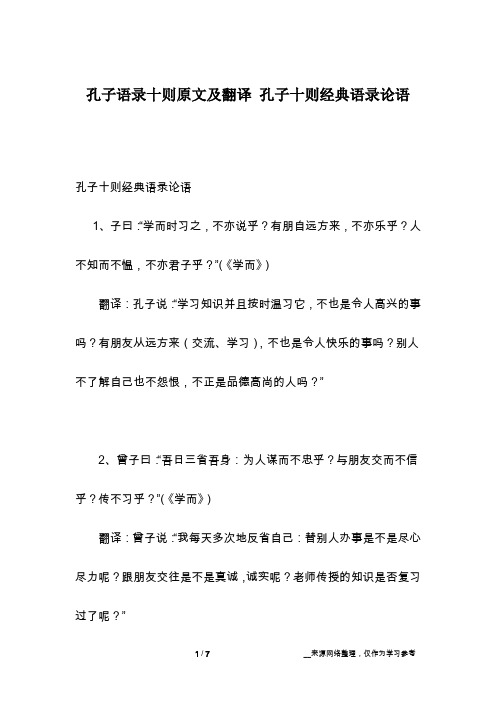
孔子语录十则原文及翻译孔子十则经典语录论语孔子十则经典语录论语1、子曰:“学而时习之,不亦说乎?有朋自远方来,不亦乐乎?人不知而不愠,不亦君子乎?”(《学而》)翻译:孔子说:“学习知识并且按时温习它,不也是令人高兴的事吗?有朋友从远方来(交流、学习),不也是令人快乐的事吗?别人不了解自己也不怨恨,不正是品德高尚的人吗?”2、曾子曰:“吾日三省吾身:为人谋而不忠乎?与朋友交而不信乎?传不习乎?”(《学而》)翻译:曾子说:“我每天多次地反省自己:替别人办事是不是尽心尽力呢?跟朋友交往是不是真诚,诚实呢?老师传授的知识是否复习过了呢?”3、子曰:“温故而知新,可以为师矣。
”(《为政》)翻译:曾子说:“我每天反复检查我的行为:为人处事有不真诚的事吗?与朋友交往有不诚实的事吗?老师教授的知识有不复习的吗?”孔子说:“复习旧的知识从而知道新的知识,可以凭借这个成为老师了。
”4、子曰:“学而不思则罔,思而不学则殆。
”(《为政》)翻译:孔子说:“只读书却不认真思考,就会迷惑;只空想而不读书,就会疑惑。
”5、子曰:“由,诲汝知之乎!知之为知之,不知为不知,是知也。
”(《为政》)翻译:孔子说:“仲由,教给你的理解了吗?懂得就是懂得,不懂就是不懂,这也是聪明啊。
”6、子曰:“见贤思齐焉,见不贤而内自省也。
”(《里仁》)翻译:孔子说:“见到贤人就要向他学习,希望能达到他的水平,见到不好的人就要自我反省。
”7、子曰:“三人行,必有我师焉。
择其善者而从之,其不善者而改之。
”(《述而》)翻译:孔子说:“三个人一起走,其中必定有可以做我老师的人,学习他的优点,如果自己也有他的缺点就加以改正。
”8、曾子曰:“士不可以不弘毅,任重而道远。
仁以为己任,不亦重乎?死而后已,不亦远乎?”(《泰伯》)翻译:曾子说:“有抱负的人不可以不胸怀宽广,意志坚定,因为他肩负着重大的使命(或责任),路途又很遥远。
把实现‘仁’的理想看作自己的使命,不也很重大吗?直到死才停止,这不也是很遥远吗?”9、子曰:“岁寒,然后知松柏之后凋也。
孔子语录系列的中英文对照
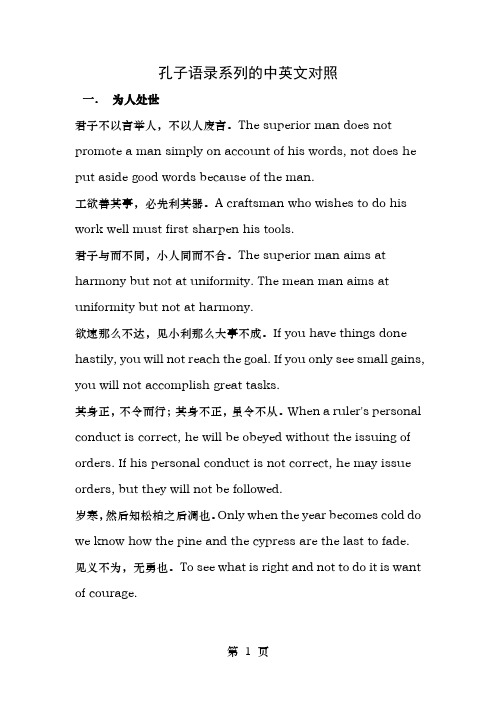
孔子语录系列的中英文对照一.为人处世君子不以言举人,不以人废言。
The superior man does not promote a man simply on account of his words, not does he put aside good words because of the man.工欲善其事,必先利其器。
A craftsman who wishes to do his work well must first sharpen his tools.君子与而不同,小人同而不合。
The superior man aims at harmony but not at uniformity. The mean man aims at uniformity but not at harmony.欲速那么不达,见小利那么大事不成。
If you have things done hastily, you will not reach the goal. If you only see small gains, you will not accomplish great tasks.其身正,不令而行;其身不正,虽令不从。
When a ruler's personal conduct is correct, he will be obeyed without the issuing of orders. If his personal conduct is not correct, he may issue orders, but they will not be followed.岁寒,然后知松柏之后凋也。
Only when the year becomes cold do we know how the pine and the cypress are the last to fade.见义不为,无勇也。
孔子语录《论语》中英文对照
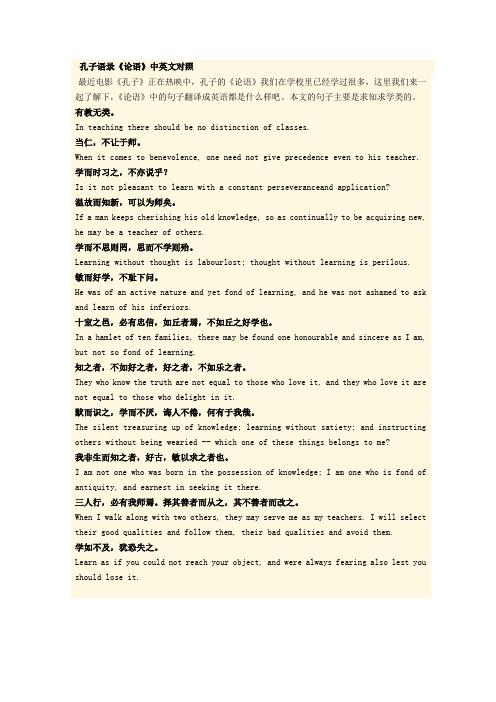
孔子语录《论语》中英文对照最近电影《孔子》正在热映中,孔子的《论语》我们在学校里已经学过很多,这里我们来一起了解下,《论语》中的句子翻译成英语都是什么样吧。
本文的句子主要是求知求学类的。
有教无类。
In teaching there should be no distinction of classes.当仁,不让于师。
When it comes to benevolence, one need not give precedence even to his teacher. 学而时习之,不亦说乎?Is it not pleasant to learn with a constant perseveranceand application?温故而知新,可以为师矣。
If a man keeps cherishing his old knowledge, so as continually to be acquiring new, he may be a teacher of others.学而不思则罔,思而不学则殆。
Learning without thought is labourlost; thought without learning is perilous.敏而好学,不耻下问。
He was of an active nature and yet fond of learning, and he was not ashamed to ask and learn of his inferiors.十室之邑,必有忠信,如丘者焉,不如丘之好学也。
In a hamlet of ten families, there may be found one honourable and sincere as I am, but not so fond of learning.知之者,不如好之者,好之者,不如乐之者。
孔子语录(论语)中英文对照翻译
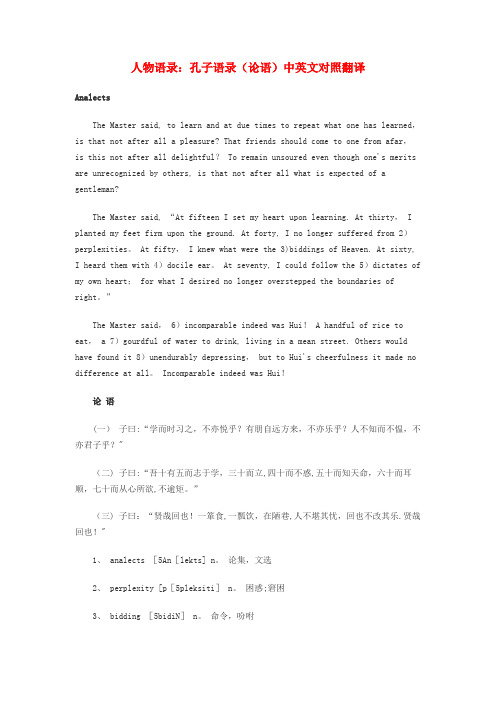
人物语录:孔子语录(论语)中英文对照翻译AnalectsThe Master said, to learn and at due times to repeat what one has learned,is that not after all a pleasure? That friends should come to one from afar,is this not after all delightful? To remain unsoured even though one's merits are unrecognized by others, is that not after all what is expected of a gentleman?The Master said, “At fifteen I set my heart upon learning. At thirty, I planted my feet firm upon the ground. At forty, I no longer suffered from 2)perplexities。
At fifty, I knew what were the 3)biddings of Heaven. At sixty, I heard them with 4)docile ear。
At seventy, I could follow the 5)dictates of my own heart; for what I desired no longer overstepped the boundaries of right。
”The Master said, 6)incomparable indeed was Hui! A handful of rice to eat, a 7)gourdful of water to drink, living in a mean street. Others would have found it 8)unendurably depressing, but to Hui's cheerfulness it made no difference at all。
- 1、下载文档前请自行甄别文档内容的完整性,平台不提供额外的编辑、内容补充、找答案等附加服务。
- 2、"仅部分预览"的文档,不可在线预览部分如存在完整性等问题,可反馈申请退款(可完整预览的文档不适用该条件!)。
- 3、如文档侵犯您的权益,请联系客服反馈,我们会尽快为您处理(人工客服工作时间:9:00-18:30)。
人物语录:孔子语录(论语)中英文对照翻译
Analects
The Master said, to learn and at due times to repeat what one has learned, is that not after all a pleasure? That friends should come to one from afar, is this not after all delightful? To remain unsoured even though one’s m erits are unrecognized by others, is that not after all what is expected of a gentleman?
The Master said, “At fifteen I set my heart upon learning. At thirty, I planted my feet firm upon the ground. At forty, I no longer suffered from
2)perplexities. At fifty, I knew what were the 3)biddings of Heaven. At sixty,
I heard them with 4)docile ear. At seventy, I could follow the 5)dictates of my own heart; for what I desired no longer overstepped the boundaries of right.”
The Master said, 6)incomparable indeed was Hui! A handful of rice to eat, a 7)gourdful of water to drink, living in a mean street. Others would have found it 8)unendurably depressing, but to Hui’s cheerfulness it made no difference at all. Incomparable indeed was Hui!
论语
(一) 子曰:“学而时习之,不亦悦乎?有朋自远方来,不亦乐乎?人不知而不愠,不亦君子乎?”
(二) 子曰:“吾十有五而志于学,三十而立,四十而不惑,五十而知天命,六十而耳顺,七十而从心所欲,不逾矩。
”
(三) 子曰:“贤哉回也!一箪食,一瓢饮,在陋巷,人不堪其忧,回也不改其乐。
贤哉回也!”
1、 analects [5An[lekts] n. 论集,文选
2、 perplexity [p[5pleksiti] n. 困惑;窘困
3、 bidding [5bidiN] n. 命令,吩咐
4、 docile [5dEusail] a. 驯顺的,驯良的
5、 dictate [5dikteit] n. [常用复]命令,支配
6、 incomparable [in5kCmpErEbl] a. 无比的,无双的
7、 gourdful [5guEdful] n. 一葫芦的量
8、 unendurably [5Qnin5djuErEbli] ad. 难忍受地,不可容忍地。
